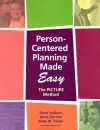
Person-Centered Planning Made Easy
3 authors - Paperback
£29.95
Steve Holburn, Ph.D., has focused his career on research and treatment of people with developmental disabilities and challenging behavior. He is best known for his work in the areas of clinical interventions for self-injurious air swallowing, reducing residential overregulation, and the effects of person-centered planning on problem behavior. After receiving a master's degree in clinical psychology at Ball State University in 1973, Dr. Holburn worked in a large residential setting until receiving his doctoral degree in special education from the University of New Mexico in 1984. His residential research included the areas of employee job satisfaction, evaluating the impact of standards for intermediate care facilities for people with mental retardation, and applied behavior analysis of self-injury. In 1993, Dr. Holburn assumed his position at the New York State Institute for Basic Research in Developmental Disabilities, where he has continued his interests in residential issues and is conducting research and treatment in the areas of person-centered planning, assistive technology, health promotion, and parents with cognitive disabilities. He is an active member of the American Association on Mental Retardation and the Association for Behavior Analysis as well as a consulting editor for Mental Retardation.
Anne Gordon is an educator and researcher at the New York State Institute for Basic Research in Developmental Disabilities. She began her career as Director of the Early Childhood Direction Center of Staten Island and then moved on to become Director of the Staten Island Early Intervention Service Coordination Office. In those capacities, she assisted parents of children with developmental disabilities to connect to, and advocate for, early intervention and preschool special education services. She has conducted personcentered planning evaluation research on implementing person-centered planning with parents who have developmental disabilities, and young adults with autism, transitioning from high school to the adult world. In addition, Ms. Gordon conducts personcentered planning workshops to local and international audiences, focusing on implementing the approach within their existing structures. Ms. Gordon is a co-author of the Health Advocacy Program: An Activity-Based Curriculum for Adults with Developmental Disabilities and is the facilitator of the Staten Island Down Syndrome Parent Support Group. She is also the parent of a young adult with Down syndrome.
Peter M. Vietze, Ph.D., is a developmental psychologist and educator who received his doctoral degree from Wayne State University in 1969. After completing a postdoctoral fellowship at University of California, Berkeley, he joined the faculty of George Peabody College for Teachers in Nashville. There he conducted research on early learning, perception, and socialization in human infants. In 1976, he moved to the National Institute for Child Health and Human Development (NICHD), where he conducted research on infant motivation and social development. Dr. Vietze became the Head of the NICHD Mental Retardation Research Centers Program in 1980 and remained there until 1987, when he moved to his present position in New York. He is also a Professor at the City University of New York. Dr. Vietze has published more than 95 research articles, chapters, and reviews and is co-author or co-editor of seven books on infant development and developmental disabilities. He is known for developing new techniques for studying infants and for his work on the causes of child maltreatment. Most recently, Dr. Vietze has been involved in projects concerned with person-centered planning, parents with learning problems, and assistive technology.